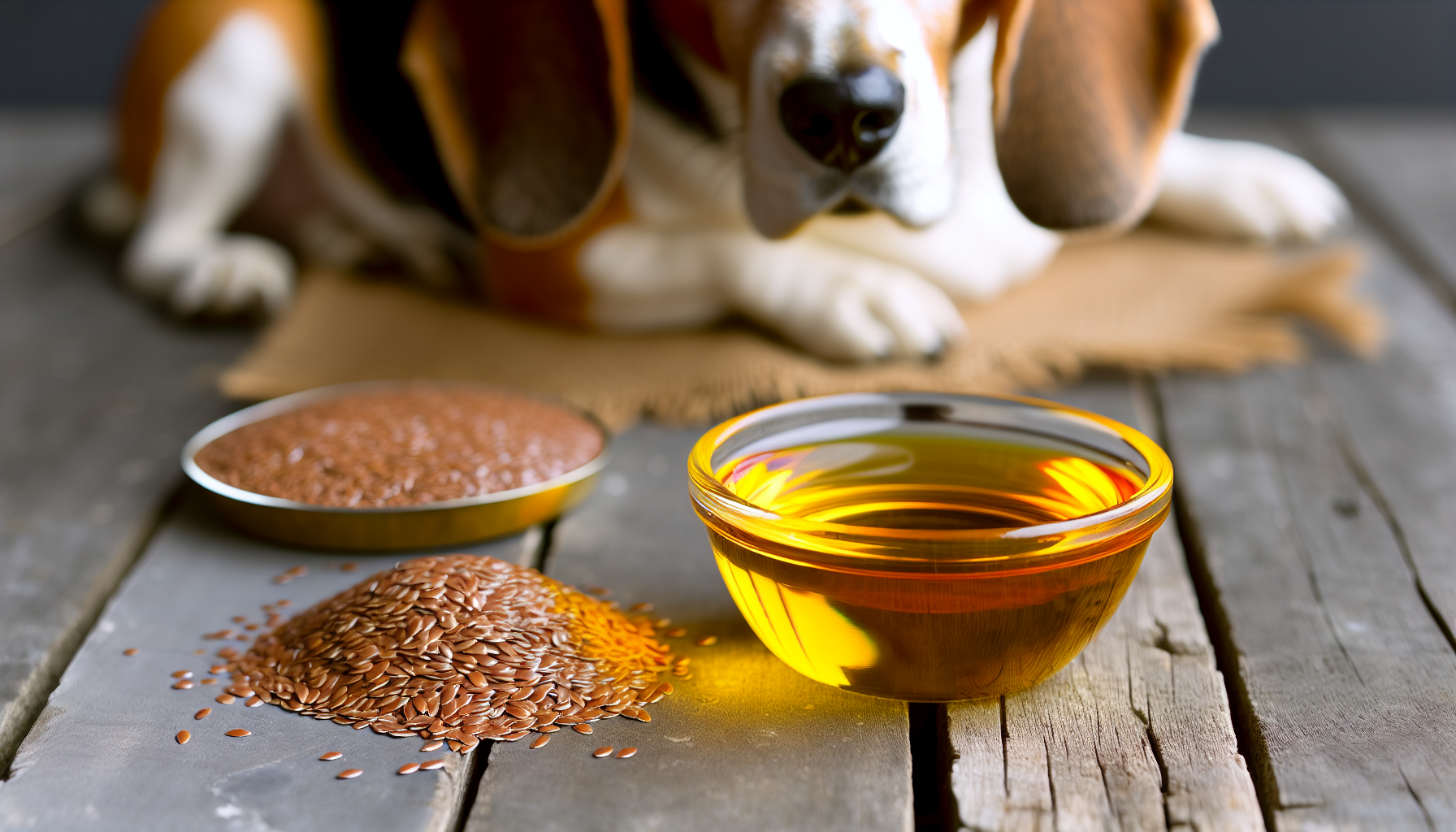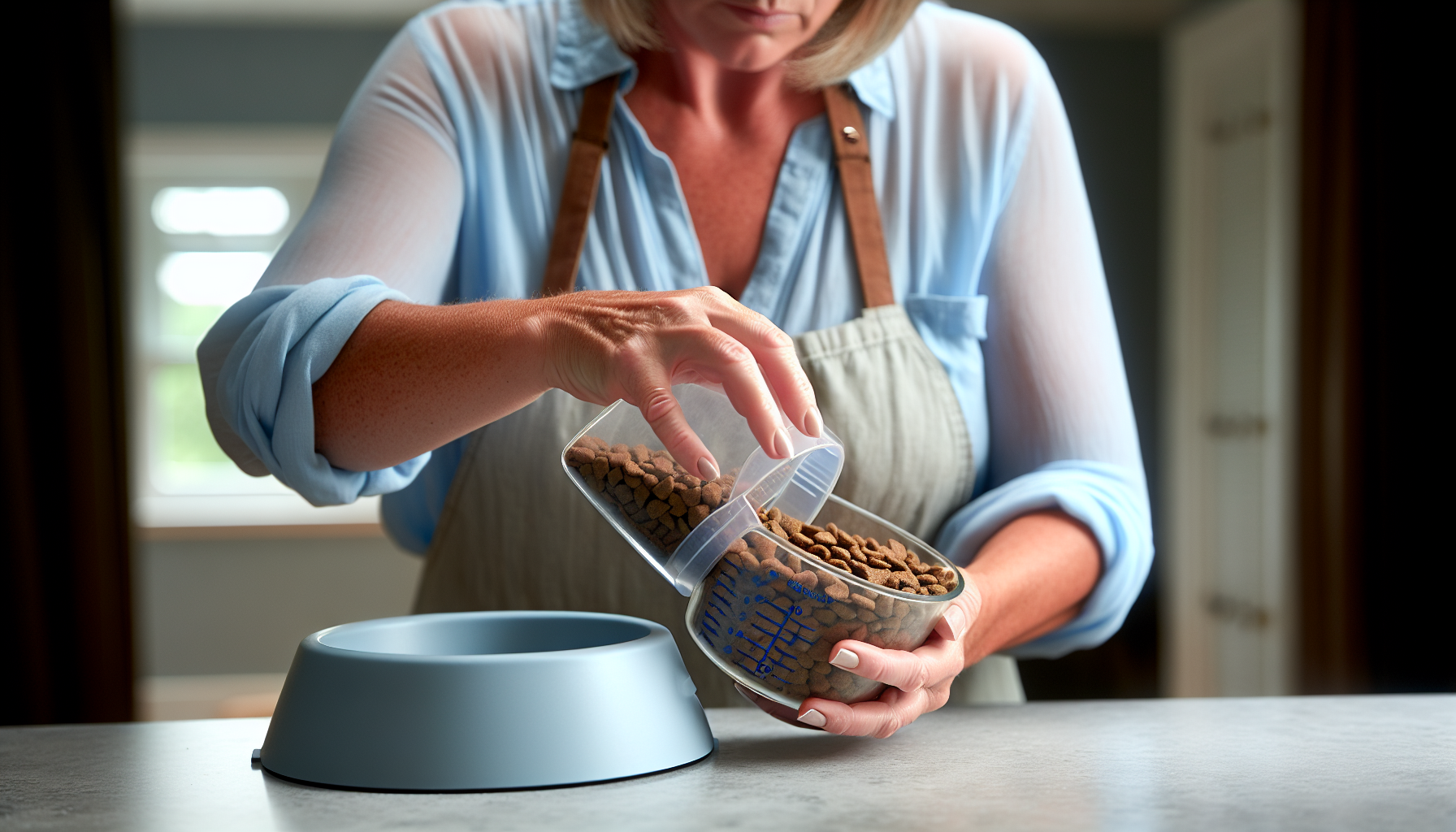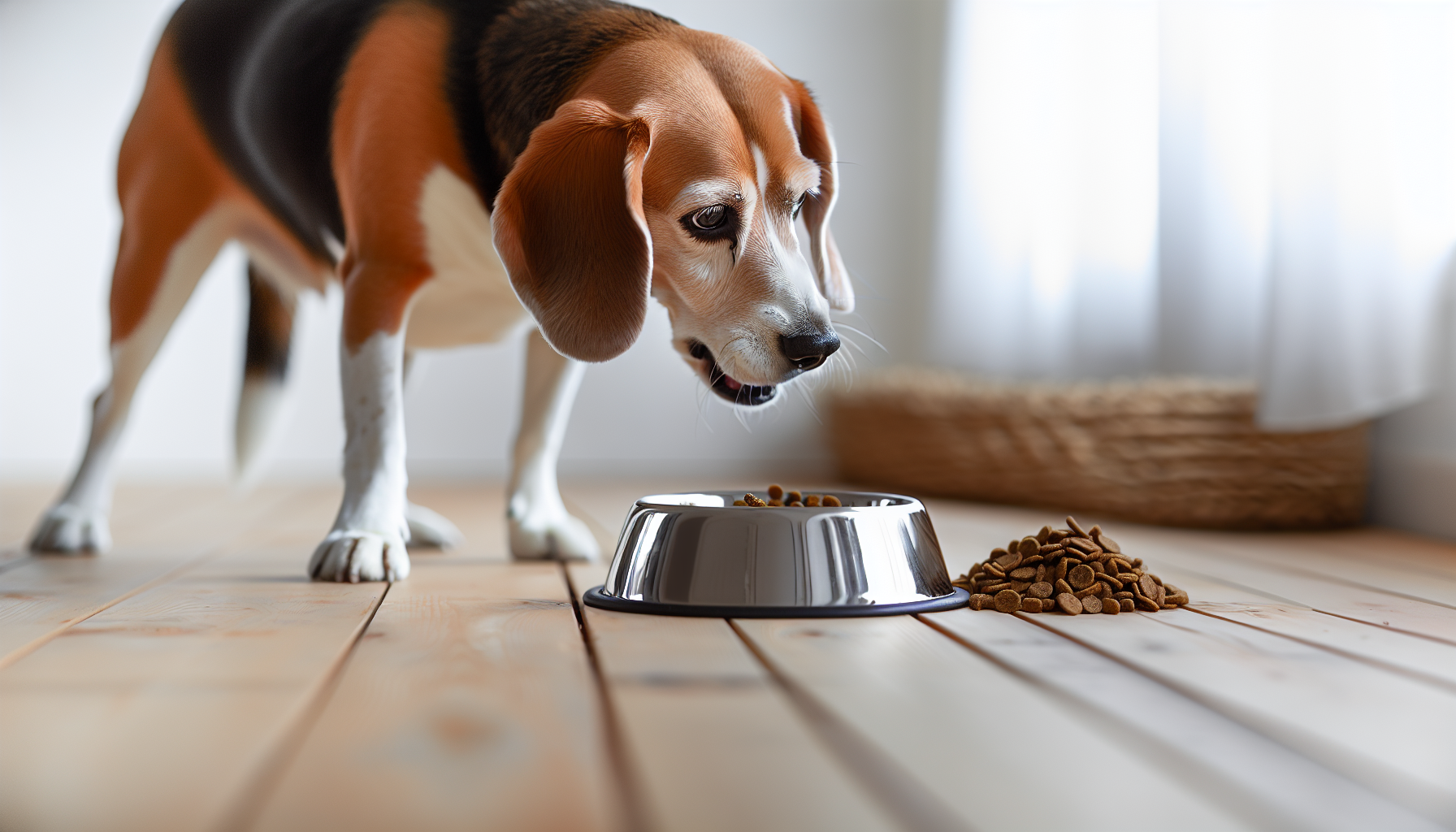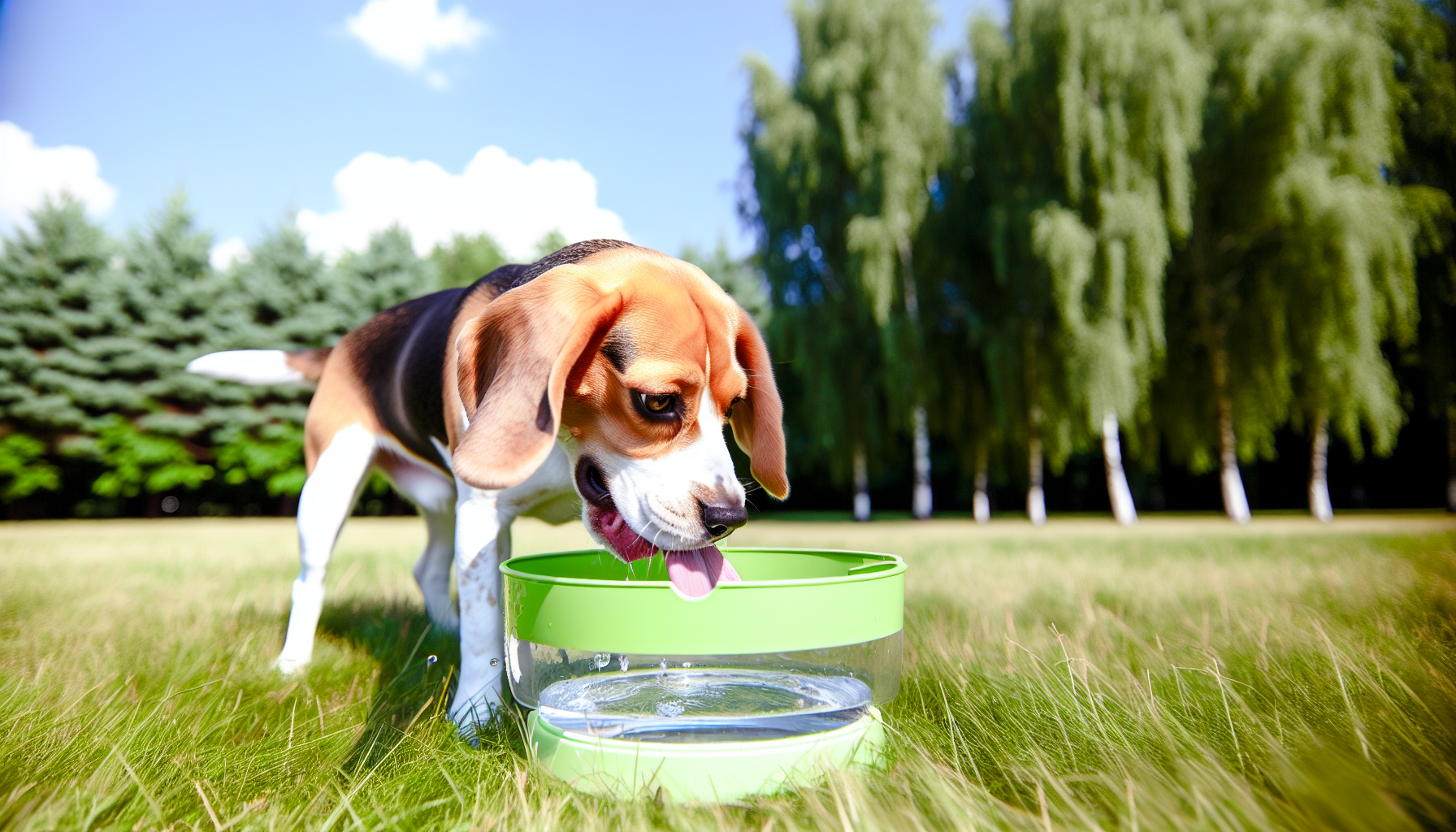So you want to know “what do beagles eat?” Meet Bella, a beagle on a mission to find the most delectable and nutritious treasures for her bowl. Her journey isn't just about any kibble but discovering the secrets of a balanced diet that caters to her unique needs. Follow along as she unearths a tail-wagging feast that keeps her nose keen and spirit high, celebrating a diet that nourishes her zest for life at every stage.

What Do Beagles Eat: Your Guide to a Balanced Beagle Diet
Key Takeaways
- A balanced diet for beagles should focus on high-quality animal proteins, essential fats, and easily digestible carbohydrates. Adjust portion sizes based on their activity levels and regularly monitor their weight to prevent both underfeeding and obesity.
- Beagle puppies require a diet rich in proteins, fats, and crucial nutrients like calcium, phosphorus, and DHA to support their rapid growth and development phases, ensuring a robust start to life.
- Effective management of a beagle's diet includes carefully transitioning to new foods to avoid digestive upset, keeping an eye out for food allergies, and deciding between dry and wet food options depending on your beagle's preferences and nutritional requirements.
Find out how to train your beagle to be the well-behaved pup you desire – Read Free Report
Deciphering the Beagle's Diet: Core Components
Beagles, celebrated for their sharp sense of smell and vibrant energy, need a diet rich in essential nutrients to fuel their daily escapades. The foundation of a beagle's diet should include high-quality proteins, beneficial fats, and easily digestible carbohydrates. Each of these components is vital for maintaining your beagle's health and vitality.
Why are these nutritional elements so important for your beagle? Let's delve into their benefits.
The Importance of High-Quality Proteins
Consider high-quality animal-based proteins as the cornerstone of your beagle’s diet. These proteins supply all the essential amino acids your beagle needs but cannot synthesize independently. Animal proteins are typically more biologically suitable and easier for your beagle to digest than plant-based proteins, making them indispensable at mealtime.
To sustain muscle mass and support overall well-being, your beagle's diet should primarily include real meats such as chicken, lamb, or fish. When selecting dog food, ensure the labels list poultry, fish, or whole meats as main ingredients, confirming your beagle receives top-quality protein sources.
Healthy Fats: More Than Just Calories

Image created using AI
Fats are not just about calories; they are essential for providing energy to your beagle and supporting healthy skin and coat. Digestible animal fats such as chicken fat and fish oil are recommended sources of healthy fats for your beagle. These, coupled with plant oils, contribute to a balanced intake of omega-3 and omega-6 fatty acids in your beagle’s diet.
These fatty acids play a dual role – they not only preserve your beagle’s skin health but also contribute to their coat health, keeping it glossy and shiny. So the next time you see your beagle’s coat glistening in the sunlight, you’ll know those healthy fats are doing their job!
Carbohydrates That Benefit a Beagle
Carbohydrates are the energy powerhouses in your beagle’s diet. Complex carbohydrates, like those found in brown rice and barley, provide sustained energy and are easier for your beagle to digest compared to simple carbohydrates.
Adding fiber-rich vegetables, fruits, and grains like brown rice into your beagle’s diet can have a significant positive impact on their digestive health. High-fiber, low-calorie ingredients like green beans or canned pumpkin can also help control portion sizes and prevent overfeeding, aiding in weight management.
So, a few slices of pumpkin or a handful of green beans, along with some fruit seeds, can make a world of difference to your beagle’s health.
Crafting the Perfect Meal Plan for Your Beagle

Image created using AI
Developing the perfect meal plan for your beagle involves more than just filling their bowl with dog food. It necessitates a deep understanding of your beagle’s specific nutritional requirements and adjusting their calorie intake and meal portions to fit these needs. Consistently monitoring your beagle’s weight is vital to ensure they receive the right amount of food—neither too little nor too much—helping maintain optimal health and preventing obesity.
Tailoring Portions to Your Beagle's Needs
Portion size is crucial when feeding your beagle. Regularly monitor their growth through weight charts or by using visual cues, such as the ability to feel the ribs and spine, which can indicate a healthy weight. For beagles that are more active, you may need to increase their calorie intake to meet their higher energy demands while carefully managing their diet to prevent obesity, which can lead to arthritis and heart disease.
If you notice your beagle gaining extra weight, there's no need to panic. Consulting with a veterinarian can provide valuable guidance on adjusting their diet to safely lose the excess weight while still ensuring they receive all the necessary nutrients for a balanced diet.
Understanding the Feeding Frequency

Image created using AI
Feeding your beagle involves more than just the quality of their diet; it's also crucial to manage the timing and frequency of their meals. Beagles should ideally be fed two to three times per day, spreading out their daily dietary allowance to help control their weight and prevent overeating.
While it might be tempting to feed a beagle whenever they seem hungry, beagles are known for their hearty appetites, which can easily lead to overeating. To avoid this, stick to a structured feeding schedule that helps maintain a healthy weight by preventing overfeeding.
Special Dietary Requirements for Beagle Puppies
Much like human infants, beagle puppies have distinct dietary needs essential for their growth. Their diets should contain at least 22% protein and 8% to 10% fat to support their rapid development. Additionally, crucial minerals like calcium and phosphorus are necessary to ensure proper bone growth. A well-balanced diet specifically tailored to meet these needs is critical for a beagle puppy’s overall health.
Moreover, DHA, an essential omega-3 fatty acid crucial for brain and vision development, should be included in a beagle puppy's diet. Ingredients rich in omega-3s, such as fish oil and flaxseed, also play a significant role in promoting healthy skin and coat development.
Managing calorie intake is also vital to avoid excessive growth rates that can lead to joint issues in beagle puppies, ensuring they grow at a healthy pace.
Identifying and Managing Food Allergies in Beagles
Beagles, like all dog breeds, can suffer from food allergies. Common allergens for these dogs include dairy, beef, lamb, chicken, chicken eggs, soy, gluten, and grains. The symptoms of food allergies in beagles can vary widely but often include itchiness, skin rashes, ear infections, diarrhea, and vomiting.
Managing food allergies in beagles is entirely feasible. Key strategies include:
- Avoiding known allergens.
- Opting for diets that are grain-free and free of dyes and additives, hydrolyzed proteins, or those that use a single-source protein.
To accurately diagnose food allergies, veterinarians typically recommend an elimination diet trial. This involves feeding the dog a simplified diet that excludes the suspected allergens. After symptoms improve, each potential allergen is reintroduced one at a time in a controlled process known as a food challenge, to pinpoint the exact causes of the allergies.
The Debate on Dry vs Wet Food for Beagles

Image created using AI
Choosing between dry and wet food is a common dilemma for beagle owners, sparking ongoing discussions in dog nutrition circles. Combining wet and dry food can offer the best of both worlds—a mix of flavors and textures that meets health needs while being cost-effective.
Dry food is beneficial for dental health in beagles, as the mechanical action of chewing kibble helps reduce plaque buildup. Conversely, wet food is often more appealing to picky eaters due to its enhanced flavor and texture. It's typically lower in carbohydrates and higher in protein and fat, which can help maintain a healthy weight.
Ultimately, the decision between wet and dry food should depend on your beagle’s individual preferences and specific dietary requirements.
Navigating Through High Quality Dog Food: What to Look For
Selecting the appropriate high-quality dog food for your beagle can feel akin to traversing a labyrinth. With so many options on the market, what should you look for? High-quality dog foods prioritize:
- Whole meats
- Good sources of essential fatty acids
- Avoiding fillers like corn, wheat, or soy to prevent overeating and obesity
- Natural preservatives such as Vitamins E and C offer a healthier alternative to chemical preservatives and contribute to the overall quality of the diet.
While some animal by-products like organs can be nutritious, it’s preferable to choose named by-product meals for clarity of source, ensuring they are handled and processed correctly to maintain quality. The presence of generic by-product meals can indicate cost-cutting and the potential inclusion of less desirable materials in dog food. Always look for the nutritional adequacy statement on labels to ensure the food meets specific life-stage requirements.
The Pros and Cons of a Raw Diet for Beagles
At first glance, a raw diet may seem like an excellent choice for your beagle, as it mirrors the type of diet their digestive system is evolved to handle—primarily consisting of fresh, high-protein foods like meat, bones, and offal. A well-balanced raw diet provides high-quality protein, healthy fats, and essential vitamins and minerals, supplemented with dietary fiber from vegetables and fruits. This can help your beagle maintain optimal health and vitality.
However, there are significant challenges as well. The formulation and preparation of raw diets must be meticulously managed to avoid risks such as malnutrition and bacterial contamination. If you're considering a raw diet for your beagle, it's crucial to thoroughly research and possibly consult with a veterinarian to ensure you can meet all dietary requirements safely.
Keeping Your Beagle Hydrated and Happy

Image created using AI
Hydration plays a crucial role in your beagle’s overall health. Typically, a healthy dog should consume about one ounce of water per pound of body weight each day. This means a 30-pound beagle should ideally drink around 30 ounces of water daily to maintain proper hydration.
To encourage your beagle to stay hydrated, always provide fresh, clean water. Consider using pet water fountains or adding ice cubes to the water to make drinking more appealing. Including moisture-rich foods in their diet, such as wet kibble and broths, can also help increase their fluid intake. Water is vital for digestion, nutrient absorption, waste elimination, and regulating body temperature, so it's essential to ensure that your beagle has constant access to water. Always keep their water bowl full and fresh!
Exercise and Nutrition: A Dynamic Duo for a Healthy Beagle Puppy
Exercise and nutrition are foundational to maintaining a healthy beagle. Engaging in regular physical activities such as walks and cardio exercises is crucial for a beagle's physical well-being, with daily activities recommended to keep them in optimal shape.
Beagles engaged in high-energy pursuits like tracking or agility competitions require a protein-rich diet to support their active lifestyles. Such a diet provides the necessary energy and nutrients for peak performance. Essential fatty acids are crucial for maintaining a shiny coat and sustaining energy levels, necessitating a diet rich in healthy fats.
By properly balancing a beagle’s diet with regular exercise, owners can help manage their pet’s weight and prevent obesity, ensuring a healthy and active life for their beagle.
When Treats Are Too Much: Avoiding Unnecessary Weight Gain
While treats are a great way to reward your beagle's good behavior, overindulgence can lead to unwanted weight gain. To keep treats healthy and beneficial, consider these low-calorie alternatives:
- Carrots
- Apple slices
- Bananas
- Blueberries
- Celery
- Peas
- Pumpkin
- Rice cakes
- Squash
- Strawberries
- Sweet potato
- Tuna tinned in water
- Watermelon
- Zucchini
Incorporating filling, low-calorie foods such as green beans or canned pumpkin into your beagle’s diet can help them feel full without significantly increasing their caloric intake, aiding in effective weight management. Treats should be carefully monitored to ensure they do not exceed 10% of your beagle's daily caloric intake. Additionally, using interactive toys to distribute treats can regulate consumption and provide mental stimulation. Depending on their size and activity level, beagles typically require between 674 to 922 calories per day.
Transitioning Foods: How to Introduce New Diets Safely
Abrupt changes in your beagle’s diet are not advisable due to the risk of digestive issues. A gradual transition over 7-10 days is recommended to help prevent such problems. Here's a step-by-step guide to effectively switch diets:
- Begin by mixing 25% of the new diet with 75% of the old diet.
- Gradually adjust to a 50/50 mix of the new and old diets.
- Then, shift to 75% of the new diet and 25% of the old diet.
- Finally, transition completely to 100% of the new diet.
During this transition period, it's crucial to closely monitor your beagle’s reaction to the new diet. Watch for any signs of digestive upset such as changes in appetite, vomiting, or diarrhea. If an immediate diet change is necessary due to health concerns, choose a new food that is similar in ingredients and nutritional value to the old one, serve smaller meals, and carefully observe your beagle for any signs of digestive issues.
Health Watch: Diet's Role in Preventing Common Beagle Health Issues
Maintaining a balanced diet is key to stave off common health issues in beagles. Beagles are at risk for heart disease, which can be exacerbated by obesity. A diet high in protein and essential fatty acids can help maintain an active lifestyle and manage weight.
As your adult beagle ages, their dietary needs change too. Senior adult beagles, typically considered those over 7 years old, require fewer calories and may benefit from meals adjusted to about 42 calories per pound of body weight to prevent joint issues and obesity due to decreased activity levels.
Summary
Feeding your beagle is a comprehensive task that extends beyond simply filling their bowl. It involves understanding their specific nutritional requirements, closely monitoring their weight, identifying and managing any food allergies, making informed choices between dry, wet, or raw diets, and ensuring they are adequately hydrated. Achieving the right balance of nutrients in appropriate amounts is crucial. A well-nourished beagle is not only healthier but also happier!
Frequently Asked Questions
What is a beagle's favorite food?
A beagle's favorite food can vary, but they often enjoy fruits like apples, bananas, and grapes, as well as meats and other treats. They have a wide range of favorite foods, from fruits and vegetables to meats, snacks, and even table scraps.
What foods should be avoided for beagles?
Avoid hot and spicy foods, as well as chocolate, onions, raisins, macadamia nuts, Xylitol, and grapes, since these can have a harmful effect on beagles. As beagles age, consider adjusting their diet to include less protein.
What do beagles like the most?
Beagles like affection, company, and having a purpose, as they are cheerful dogs with hunting instincts. They do best when given the opportunity to run and explore through smell.
Can Beagle drink milk?
Yes, Beagles can drink milk in small amounts as an occasional treat, but it's best to consult with a vet before introducing it to their diet to ensure they don't have any dairy allergies or sensitivities.
What are the core components of a beagle's diet?
To keep your beagle healthy, make sure their diet includes high-quality proteins, healthy fats, and digestible carbohydrates. This will provide them with essential nutrients for their well-being.
Learn how to train your beagle to be the well-behaved dog you desire –> Access our Free Report
Shop for beagle-themed products and gifts that beagle enthusiasts will love.
